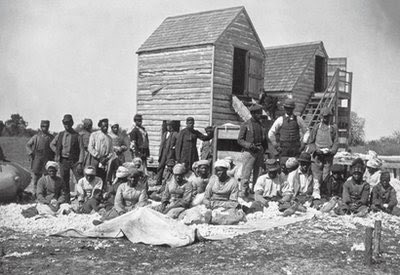It is important that as we celebrate #Juneteenth and freedom this weekend, that we also recognize how for the descendants of the #Gullah Geechee, the year 1865 marked the opposite—the broken promises and dashed dreams of freedom. A Thread:
I am a descendent of Gullah people, who were given a taste and a test of freedom immediately at the outbreak of the Civil War in 1861. All the white people ran scared & black folks in Beaufort and surrounding islands began to imagine freedom concretely. blackpast.org/african-americ…
That early taste of freedom called “The Port Royal Experiment” proved successful. The formerly enslaved in Port Royal (numbering about 10,000) understood that if white people would just stay gone, literally the sky would be the limit. en.m.wikipedia.org/wiki/Port_Roya…
As early as 1861, during this experiment, black people were first paid for their labor. They were allowed to imagine exactly how they could re-construct sites of slavery and brutality into sites of liberation. 

Also in 1862, the famed Penn School (now Penn Center) was founded on St Helena Island to train people for freedom. It was the first school built specifically for Black Americans in the South. penncenter.com/explore-penn-c…
In 1862, the town of Mitchelville, the first self-governed black town, was formed on Hilton Head Island. They are actually having a Juneteenth celebration this weekend: eventbrite.com/e/juneteenth-c…
Not only were black people getting educated, making wages, & being self-governed, but they were also now allowed to own & buy land. Note:40 Acres & Mule was not national. It came from a demand by black ministers that land from coastal SC to FL be given to those who worked it.
By the Fall of 1865 it was clear that the 40 acres and a mule would be canceled, though a few black families managed to buy land. Promises were broken.
So some had to start working for white people sharecropping, though places like Hilton Head remained majority black and continued to be majority black well into the 20th C. For example, 95% of the Island’s 1,100 residents were black in 1940. hiltonheadisland.org/gullah/history/
Emory Campbell, former director of the Penn Center, has a great book about what life was like on Black Hilton Head. He also currently has a company that runs Gullah Tours on the Island. 

I also think about 1865 as being the year that South Carolina passed a new set of “Black Codes. In June of 1865 President Johnson created a board of Governors of all former Confederates. Their goal was to get SC as close back to slavery as possible. ldhi.library.cofc.edu/exhibits/show/…
When I think about Emancipation, I think about what Baldwin wrote in The Fire Next Time in 1963, in celebrating the 100 year of emancipation, “You know, and I know, that the country is celebrating one hundred years of freedom one hundred years too soon.”
Plus, today marks 6 years that 9 black people were killed in the basement of Emanuel AME, the same church to which Denmark Vesey belonged when he was ready to lead a revolt because he believed, though he was free himself, that all Black people could be free.
So going into the weekend I’m contemplative. As the old song goes, “I woke up this morning with my mind stayed on freedom.” I’m hoping one day we will all know what it means to be free. #JuneTeenth2021
• • •
Missing some Tweet in this thread? You can try to
force a refresh



